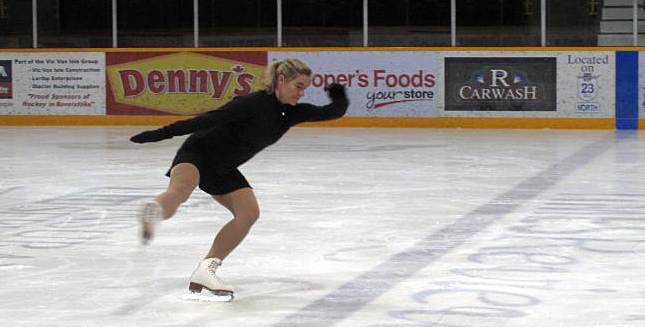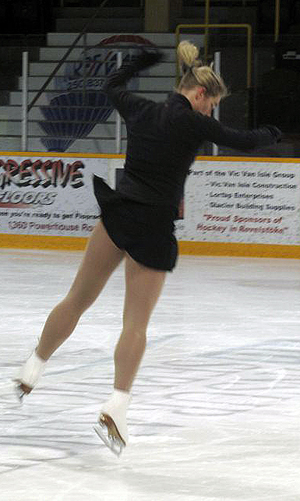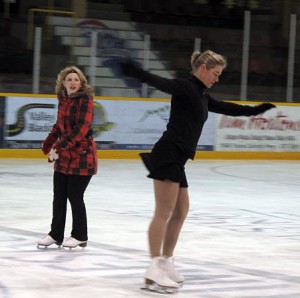
By Laura Stovel
When you think of figure skaters – the sport aimed at achieving the athletic, graceful and finely-crafted spins and jumps on ice – you don’t tend to think of people who are much past their early twenties. Unlike hockey, skiing and hiking, figure skating just doesn’t seem to be a lifetime sport.
But Cathy Cameron-Suchy is challenging that idea. It is 7:00 in the morning and the 44-year-old mother of three is out on the ice, practicing her spins and dance steps. Tall and slim, wearing a black figure skating dress, she cuts a striking figure as she glides across the ice.

Cameron-Suchy started skating four years ago, joining with her daughter, Clara, who was 11 or 12 at the time. “I’ve always loved figure skating and dancing,” she said. “And then because my daughter was doing it, I thought I’d do it too. I knew how to skate but I had never figure skated before.”
Cameron-Suchy, who is also a piano teacher and English language instructor, speaks of her figure skating training in the same, deliberate way as she might speak of teaching piano. Four years ago, “I started on a program that any figure skater would do and I think that’s the best way. So I went on the ice with the 10-year-olds and did what they did,” she said.
Being an adult did not mean that Cameron-Suchy progressed faster – or slower – than her cohorts. They went about the same pace, she said. Adults sometimes have the advantage of “being able to focus better, and focus on practicing the elements,” breaking down steps and working on them as a piano student would practice a musical phrase.
Adults have the disadvantage, though, of knowing what they want to achieve and possibly being frustrated if they don’t get there quickly, she said. “Adults expect too much in too short a time. It’s a slow learning process and you just have to stick with the program and be satisfied” with that. “That’s where kids have an advantage. They don’t see where they’re going” so they enjoy the moment.
Skating coach Sabrina Hinson described Cameron-Suchy as “inspiring.” “With other

adults I’ve taught the basics but with Cathy it’s a little different. She’s doing tests,” she said.
No other adults are figure skating in Revelstoke at the moment, Cameron-Suchy said. An effort to form an adult synchronized skating team in the fall did not pan out although 20 women showed up for a meeting to explore the option “so there’s obviously a lot of interest. We certainly can try it again,” she said.
Cameron-Suchy would also like to see some men join the skating club. “Maybe I’ll find a male ice dance partner,” she said, adding that there are some male figure skaters in Revelstoke.
Although adult figure skaters are not as common as youth skaters, there are adult competitions, even at the national and international levels, Cameron-Suchy said. She is not competing but she is taking her tests and advancing steadily. Right now she is preparing for the final figure skating show of the season where she will be skating a routine with the senior skaters. The show will be held at the arena on Thursday, March 17 at 6 pm.



